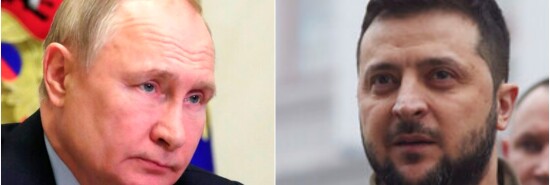
Why Russia would be foolish to assassinate Zelensky, and Ukraine foolish to assassinate Putin
Tom Rogan
Video Embed
Authorities in Ukraine believe they have disrupted yet another Russian assassination plot against President Volodymyr Zelensky.
Ukraine’s SBU domestic security service has detained a woman whom it accuses of gathering intelligence on Zelensky’s movements. The woman apparently intended to provide Russia with advanced warning of Zelensky’s next visit to southern Ukraine. Russia would feasibly then be able to launch a major missile attack targeting Zelensky.
PUTIN GIVES NAVALNY THE GULAG AND PRIGOZHIN A FIVE-STAR PASS
But whether this particular plot was credible or not, I’d suggest it now makes little sense for Russia to assassinate Zelensky. The same goes for Ukraine and any effort to assassinate Russian President Vladimir Putin.
The main risk for any Russian assassination of Zelensky would be in unifying the international community around Ukraine. Russia’s repeated attempts to assassinate Zelensky at the start of its February 2022 invasion may have made sense. Those efforts certainly fit with Russian war strategies reaching back to the Soviet era, which, incidentally, is why the U.S. Secret Service and military invest so heavily in the continuity of government contingencies.
The major problem for Moscow is that Zelensky is now commonly viewed abroad as a heroic leader. Were Russia to kill him, it would risk reinforcing the already widespread foreign perception that its war is an utterly unjust one. It would risk making Zelensky a martyr. It would certainly encourage greater military and financial support for Ukraine, not less support. It might even lead to a cooling of Beijing’s support for Moscow, being that Beijing would fear attracting European Union’s increased ire were it to continue supporting Russia following Zelensky’s assassination.
Ukraine’s order of presidential succession means that Zelensky would be replaced by Ruslan Stefanchuk, Ukraine’s parliamentary chairman. And while the rotund Stefanchuk lacks Zelensky’s sprightly charisma, Ukraine’s will to fight clearly extends far beyond Zelensky’s persona. Put simply, Russia could kill Zelensky, Stefanchuk, and whoever else replaced them, but in so doing, it would likely only reinforce the resistance it faces. The Ukrainian people now view Russia’s war for what it is: an effort to subjugate their democratic will to Moscow’s whims. Leadership assassinations would only reinforce that perception.
Ukraine also needs to be wary of assassination plots.
While there is little evidence of any Ukrainian attempts to kill Putin, sometimes eccentric Ukrainian covert actions, such as its assassination of ultranationalist Darya Dugina and possible destruction of the Nord Stream 2 pipeline, suggest a future plot cannot be ruled out. It’s also clear that Zelensky is becoming more impulsive.
Although Ukrainians might welcome the killing of the leader who has unleashed such misery upon them, that course of action would be unlikely to facilitate Ukraine’s key strategic objective. Namely, the dislocation of Russian forces from Ukrainian territory. Considering that Russia’s SBP presidential security service is both competent and well resourced, any Ukrainian assassination attempt would carry a high risk of failure alongside inherently negative corollary consequences.
Even an unsuccessful attempt to assassinate Putin would probably play to his propaganda narratives. The Russian leader has already shown an interest in inventing Ukrainian assassination plots. We gained an example of this last April, when Putin falsely accused the CIA of helping Ukrainian agents plot to kill a Russian propagandist. In turn, Putin would use any attempt on his life to mobilize the Russian people around him. Putin might also find benefit from an assassination attempt in the form of its consolidation of the Kremlin elite’s support. Putin has great need for that consolidation following Yevgeny Prigozhin’s aborted June coup attempt.
Were Putin actually assassinated, however, it would be foolish to expect a more conciliatory figure to replace him. Russian history and political culture suggest a predisposition toward a siege rather than appeasement mentality during a national crisis. As Putin retains significant popularity among his citizens, his assassination would likely be used by an even more hawkish leader to cement the hawk’s new leadership position.
This is no small concern.
CLICK HERE TO READ MORE FROM THE WASHINGTON EXAMINER
As shown by the transition of once moderate former President Dmitry Medvedev into a mouth-frothing uber-hawk, the ascendant political constituency in the Kremlin is not that of boring bureaucrats such as Prime Minister Mikhail Mishustin. Instead, it is that of the ultra-hawk Nikolai Patrushev and vicious oligarchs such as Igor Sechin. As Russia’s Security Council secretary, Patrushev seeks the restoration of Russian imperial power. He is a master of the darkest arts and an ardent anti-American. Were Putin to be assassinated, Patrushev would likely have both the political capital and the ruthlessness to quickly consolidate power. That would mean a more intractable war with Ukraine alongside a greater risk of nuclear escalation with the West.
Top line: States should seek to act in their own self-interest. In that regard, it’s far from clear that the leadership assassination campaigns would be beneficial for either Ukraine or Russia.
